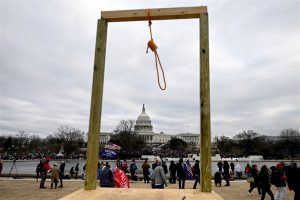by Kyle Callahan
During the insurrection attempt in Washington D.C. on January 6th, members of the mob strung a noose from a makeshift gallows on the west side of the Capitol. Thankfully, the mob couldn’t capture members of Congress during the chaos, but the image of the noose with the Capitol building in the background continues to shock.

AFP – Getty Images
The Pew Research Center reports that a month before the 2020 Presidential election, “roughly nine-in-ten [registered voters] worried that a victory by the other [party] would lead to ‘lasting harm’ to the United States.” This partisan acrimony continues a trend that Pew has seen for the last twenty years.
But here in Poultney, that divide has always been present, going back to the earliest settlers of the town.
The third volume of The Vermont Historical Gazetteer, a massive history of Vermont towns first published in 1861 by Abby Maria Hemenway, details a scary event in 1777 after the British troops chased off Poultney’s residents following the battle at Hubbardton.
While most of the residents considered themselves Patriots, Hemenway reports that “there were but two Tories in town, [and] Gilbert Soper was one of them.” With the town emptied, Soper “remained and made a pretty free use of such things as were left.”
Unfortunately for Soper, a scouting party led by a Poultney resident named Lieutenant James Smith came across Soper “while stopping for refreshments.” When Lt. Smith went into a house, some of the Patriots decided the time was ripe for revenge on their Tory neighbor.
The men seized Roper, “put a rope around his neck, tied it to the well sweep and began to draw him up.” When Smith learned what was happening, he “sprang out and ordered [Soper] let down just in time to save his life.”
Perhaps there’s a lesson for modern-day Americans in Roper’s and Smith’s relationship. While the two men differed significantly in their politics, “they both remained in town many years, Soper a thievish troublesome fellow [and] Smith an unfortunate and very poor man.”
Then again, maybe there isn’t a lesson because Smith “often said he believed the curse of God had followed him for saving Soper’s life.”
Soper eventually moved north with his brother, settling in Milton. Smith stayed in town until at least 1790 when he appears in the Census.
Thanks to Margaret “Peggy” Jenks of Granville, NY, for bringing this story to the attention of the Poultney Historical Society.

Comments are closed.